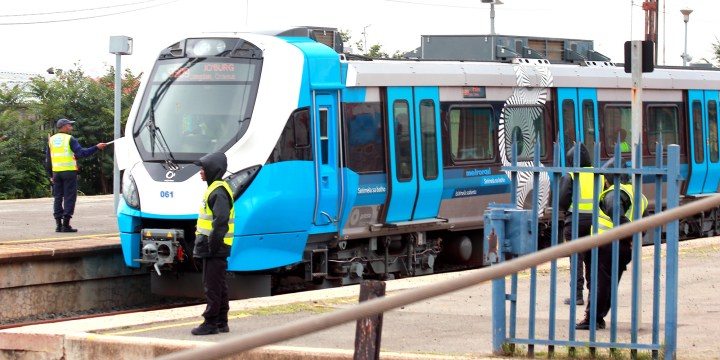BUSINESS REFLECTION
After the Bell: Being railroaded by Prasa

You do have to have some sympathy for the new Prasa management and their board. This is crisis management at its most extreme. So, how is it going? Factually, not well, notwithstanding the line openings.
If you want to read a great piece of journalism, take a look at this story on the Passenger Rail Agency of South Africa (Prasa) written by amaBhungane reporter Tebogo Tshwane. It’s such a wonderful illustration of everything that has gone wrong with SA’s state-owned enterprises through the lens of a detailed look at a comparatively small contract to maintain Prasa’s trains.
Outside of Eskom, there is almost no institution that has collapsed so resoundingly and disgracefully as Prasa.
In 2011, Prasa, the story goes, undertook 225 million passenger train trips. In 2021, it undertook 17 million – a 93% decline. SA has 590 stations, of which 134 are functional. Technically, there are 40 passenger lines; only 19 are running. And so it goes on.
The recent history of Prasa was encapsulated by the decision, you’ll recall, to buy trains that were too tall, using an intermediary company called Swifambo – a transparent skimming exercise, it turned out.
This story has been told ad nauseum and at length to the Zondo Commission. But one aspect bears repeating: According to the Special Investigating Unit, Prasa will, at best, be able to recover just over R60-million of the R2.3-billion it paid to Swifambo from the ill-fated procurement, partly due to the company’s liquidation.
Woohoo! That’s 2.6%!
As I have noted before, corruption within a corporate structure invariably destroys it. Why? For lots of reasons; money goes missing, of course, but somehow, more importantly, the corporate ethic disappears. And then the best people leave, because they don’t want to get caught up in the battle, and the worst people stay because they always do.
I remember taking the train between Johannesburg and Soweto way back when. It was too much fun. There were religious carriages, ANC carriages, IFP carriages, everyone was singing. People hung out of the doors. It was just madness, but somehow, the train left and arrived. This was and is an absolutely crucial transport link, of course.
That line has just been reopened, along with several others, including Mabopane-Pretoria, Saulsville-Pretoria, Pienaarspoort-Pretoria, Cape Town-Simon’s Town, Cape Town-Bellville, Cape Town-Langa, Tongaat-Durban Diesel Traction Services and Durban-Merebank.
The Soweto-Johannesburg train costs about R17 a trip, compared with a taxi fare of around R40, which demonstrates how economical trains can be for commuters and how valuable the re-establishment of a functional train service could be.
Visit Daily Maverick’s home page for more news, analysis and investigations
But there is a long way to go – this is not a regular service, with only two trains running during the morning and evening peak periods, and none over the weekend. Is that enough? Probably not.
The new board and management of Prasa is obviously trying to save an organisation that is absolutely on the brink. Of course, being South Africa, the decision to fire some of the old management, who the board decided was part of the corruption, hit a snag when their dismissal was revoked by the Labour Court. Some t was not crossed, or i dotted somewhere, obvs. The decision is being appealed. Just another day in the morass.
In any event, you do have to have some sympathy for the new Prasa management and their board. This is crisis management at its most extreme. So how is it going? Factually, not well, notwithstanding the line openings.
Back to the news story. Because maintaining the trains is a crucial function, Prasa put out a hefty tender for R7.5-billion for train maintenance in various locations. The first tender was put out in 2019 but attracted no bidders. It was reissued in 2020 and awarded last year – 15 companies submitted tenders and five were granted them at different places around the country.
So now, of course, the remaining 10 companies are pissed off – losing bidders always are. But their case is massively enhanced since one of the unsuccessful bidders was fellow parastatal Transnet, the most obvious and natural candidate, partly because a) Transnet did it before, b) has the capacity, and c) owns the most crucial component of the maintenance process: a warehouse with rail access.
Transnet was excluded because it was not able to show three years of audited statements since, oh yes, Transnet was also a State Capture victim. But most of the winners weren’t fully able to do so either, because they were quite obviously fly-by-nights. We know this because when they won their tenders, the winners immediately tried to rent rail warehouses from Transnet!
And so on – you can read it all. It’s obvious that there is a suspicious aspect to the tender system, but also that the system is immensely complicated. Clearly, what has happened is that because corruption is now rampant, the part of government that is trying to put a halt to it – mostly the Treasury – has decided to impose a huge array of requirements and checkboxes. Jumping through these hoops, even if you are honest, is extremely difficult.
What occurs to me in this sorry tale is that there is a crucial piece of the puzzle missing: the board.
What happened, in this case, is similar to what I imagine happened in hundreds of other cases. The obvious companies that tendered were selected, but when it got to the board level, all those plans were dumped in the wastepaper basket and new candidates were preferred. I’ve seen this happen dozens of times now in SOEs.
And behind those decisions is a huge failing of accountability for the simple reason that the main agent of accountability and transparency – the board – is not part of the solution and is actually the biggest part of the problem.
Ideally, boards are the accountability check and are not themselves the primary decision-making bodies. And yet, because they are packed with politicians and general hangers-on, they subsume the role of management and start trying to run the company – in part, you suspect, because often management themselves are doing such a terrible job.
Perhaps this is all very obvious, but it does seem important to me that with SOEs, there is clearly an ethics problem. Equally, though, there are structural and functional issues that exacerbate the problem. BM/DM


















I last took the train from Johannesburg to Pretoria in 2010: little did I realize it would probably be my last ordinary train journey in S.A.. I love trains and would use the train instead of flying if I could, alas, it would probably would be my last journey, ever.